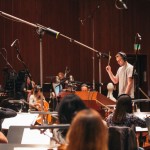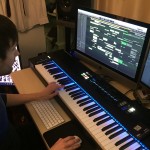Okay, so he has quite a sense of humor. The above flyer for Osamu Kubota’s “Piano Fetish” concert from 2003 is honestly a joke, but really, who doesn’t love to put on a little makeup now and then?
While Osamu Kubota isn’t a household name in the States, his work on the Beatmania series and the Korean MMORPG Granado Espada have earned him recognition among game music fans. He’s actually somewhat of a renaissance man, having worked on film, games, and independent efforts through his studio, Musique de Poche, and his fluency in English, Japanese, Korean, and Chinese make him a fitting ambassador for music throughout Asia.
As an accomplished pianist, Kubota brings a unique perspective to game music. Having worked with a live orchestra on the recording of Granado Espada, he is on the cutting edge of game audio, effectively combining live performances, electronic elements, and processing techniques that lend his work a distinct polish. We’ve finally been able to sit down with Kubota to discuss his past, his philosophy on music and games, and what he has in store for fans in the future. To my knowledge, this is the first interview he’s done for an English game music outlet, so it’s a great pleasure to introduce to you Osamu Kubota.
Hit the jump for our lengthy interview with this extremely talented and passionate (and beautiful?) musician.
OSV: Tell us about how you found your way to the gaming industry. You have a lot of experience outside of gaming, so how did you come to be where you are today?
Kubota: My professional career exceeds two decades but I’ve worked for games for less than a half of that. I actually never struggled to get into the game music world, but my fate lead me there. A trigger was my participation in Konami’s Beatmania series, introduced by my intimate friends TaQ, djTAKA and good-cool back in 1999.
OSV: Your projects in the gaming industry have been almost exclusively with Konami. Describe your experience working on the Beatmania series and how your distinctive use of piano has found a place among the electronic music that dominates the franchise.
Kubota: I owe it to a long-term friendship with djTAKA. One day before Christmas in 1999 he showed me Beatmania and consulted with me about what authentic piano would be like in it. I said, “Okay, why not try?” and the motif in “Presto” came into my brain immediately. I had no idea about the game itself, but he said “There’s no speed limit” which pushed me forward. I intentionally employed Bach-styled fuge combined with a jazz/fusion groove, which Japanese teenagers in 90s would avoid as ‘boring’ or ‘old-fashioned’ at that time.
OSV: Your largest project outside of the Beatmania series has been Granado Espada, which is one of my favorite game scores of 2007. How did you become involved with that project, and what did it mean to you at the time? You also had the opportunity to record an orchestra in China for the title, so please tell us a little about that experience as well.
Kubota: I was so surprised to hear Kim Hakkyu, the boss of Ragnalok Online, was a fan of my music. He contacted me in 2005 and suggested we work together on his new title, which sounded so fabulous. That was Granado Espada. Its European perspective was familiar to me since I lived in France before, and Kim wanted me to elevate its classical perfume and make it catchy at the same time.
A real orchestra was seriously needed, so I decided to employ the Asian Philharmony Orchestra in China with whom I worked in 2004 for an award-winning film “A Letter from an Unknown Woman.” They often work with a famous director Zhang Yimou and create a big sound. Their technique is surprisingly agile and, most importantly, they understand my music very well. I travel to Beijing to work with them for almost all the projects I am involved in.
OSV: Being a classically-trained performer/composer, I notice you use a lot of electronic sounds and write some unique tracks. How do you go about composing music?
Kubota: Do you think so? I usually don’t go electronic… I would personally like to record with real strings, piano and percussions. However, for some game music the sonic ‘edge’ is required, especially for tracks to be played at noisy arcades, so I add loops or synth tracks. Or maybe I am influenced by TaQ.
OSV: Your music blends beautiful piano ballads with pumping electronic beats, so I’m curious to know some of the composers or musicians who have influenced your writing style, or whom you admire.
Kubota: Again, my style is rather old-fashioned, but not a simple simulation or copy of what others do. I adore Pat Metheny and Ryuichi Sakamoto, not for what they did but from their attitude to develop their own styles continuously.
OSV: What games are you currently playing, if any? Do you ever find the time to play the titles that you create music for?
Kubota: I used to be a gameaphobe, no kidding. Even today I hesitate to play when my family forces me to sit in front of PC… but thank to my wife playing Granado Espada everyday, ironically, I’ve come to understand more of the contents than when I composed for it.
OSV: Is there a game or a game series that you would like to write music for? You are often thought of as a “Beatmania composer.” What are your thoughts regarding that label?
Kubota: Not only for Beatmania, but generally I don’t like to be categorized as a composer dedicating his own life to a title! That kind of description apparently limits both my future and listeners’ imaginations. Please set me free. I would love to bring my film scoring taste into games, so any cinematic MMORPG would be welcomed. Brand-new projects are better than the existing titles, but something like Final Fantasy or Evangelion should meet my dream.
OSV: What would you like to hear more of in the gaming industry? I imagine as a performer, you’d like to hear more live performances in games?
Kubota: Not necessarily. In my latest track “Avant-guerre” in Beatmania I tried to build a ‘virtual piano’ where game players could feel as if he/she performed in a classical piano solo concert, but that shows just one possibility of what the arcade game could offer. I want young people who want to play instruments to go for REAL instruments, not games! Games, in my opinion, should work more for connecting people. For example, one common MMORPG title played in Japan, Korea and China can elevate mutual understanding in Northeastern Asia despite of political controversies. Games can be a miracle that eliminates racism. But this would fail if game developers intentionally focused to this issue too much. Simply, be aware and let it be.
OSV: What’s your current studio setup? What kinds of hardware/software are you using to create music, and which are your favorites?
Kubota: I used to eat and sleep surrounded by stacks of keyboards, but when I moved to my current place in 2006 I sold off most of modules and keys, trying to build minimized workroom with first-class gear only. In a photo you can see my workroom lacks in typical studio-like taste of interiors and even looks like a study room in a university with tall bookshelves and a big desk from IKEA to write scores on. Yes, I position this space as a headquarter for all my tiny intelligence to emit the world…
My current tools are: octa-core MacPro with Apogee Ensemble, Kurzweil Midiboard & K2600x, Oberheim Xpander, Roland D-50, Waldorf Microwave, Presonus and Focusrite preamps. Hafler amp and KRK6000 for monitors.
As for software, I’ve been a stubborn user of Logic for decades since the Atari era. Sonnox Oxford and Altiverb are my favorite for effect processing. And I chose Vienna Instruments to make demos to show to the directors. For piano samples I employ Galaxy II and SampleTekk from Sweden, although I record real piano in proper halls/studios more often. You know in 90s it was enough to present piano demos on a cassette to film directors and say “it should be replaced by orchestra, ok?” which is regarded too rude today! Logic/Vienna system can easily generate scores and live until final mixes occasionally.
Apparently, the equipment scene is far less exciting than it used to be, as it’s all going inside the PC. But it’s good I realize tools are only tools and now I don’t waste time for them. It was a long and winding road until I know what I am and share more time and energy for creating music than soldering cables.
OSV: You often use vocals in interesting ways in your music. “-Perplexity-“ from the Beatmania series and “Odyssey” from Granado Espada each use vocals in interesting ways. Tell us about these pieces and your use of vocals in each piece.
Kubota: That style was from my musical experiment with TaQ in 1996. The song is later published as “Libra Negra” included in my solo album “Snow in Saigon”. I record 24 tracks of my voice at maximum with lyrics which were phonetically invented and has no literal meanings whatsoever. This was not only a musical experiment but also a phonetic one; I tried to build up using consonants and vowels which don’t exist in my native language, Japanese. Later I heard a news from Korea that elementary school students were obsessed with my lyrics and struggled hard to analyze what I meant day and night, even with mobile phones in the classrooms, and it became somewhat of a social problem… I told them to stop it and listen to their teachers instead, as the lyrics meant nothing!
I employ this recording fashion quite often later, including “MAYA” in Granado Espada, virkato’s concerto rearrangement for Konami, and my current projects, NED Online and a Japanese animation titled switch.
I hope this doesn’t derive from my complex that I shouldn’t be a good singer alone, though…! Yes, I hope…
OSV: When I mention the name Osamu Kubota, fans often mention “Mind the Gap” and “Presto” from the Beatmania series, both of which are forays into the realm of jazz. Tell us about these pieces and your thoughts the jazz genre. Were you trained as a classical pianist or a jazz pianist?
Kubota: I was trained as a classical pianist first, but played at a lot of jazz/fusion gigs in my teens. What I did for these songs could sound new to young ears today, but it’s a simple transcription of my treasured experiences. Look at Keith Jarrett, is he classical or jazz pianist? No, Keith is Keith.
OSV: What has been your favorite project thus far, and why?
Kubota: Granado Espada was superb. I didn’t think too much, and my musicality automatically sat where it should be.
OSV: You have had the opportunity to work for the music-based Beatmania series for many years. These projects obviously give you a lot of freedom to create, so when working on a game score, how do you balance personal musicianship with the project’s bigger picture?
Kubota: Easy. I compose only when I agree to their directions offered. That limits a number of my tracks in each season, though. I won’t join this coming season, either.
OSV: What do you expect to see in the future for game audio?
Kubota: No tricks or any surround magic; simply improve the play-back facilities! Now is the era when people listen to music in the poorest equipments ever… bloody compressed files played back with mobile phones or PC speakers will surely ruin young people’s imaginations on music. Remember the ‘70s and ‘80s! My father’s generation always listened to music with 3-way speakers and, even stereo radio-cassette sounded better than today. More seriously, engineers, including musicians doing self-mixing, work harder and stop mixing with poor speakers just because listeners’ speakers are supposed to be poor! You are responsible for teenagers’ ears.
OSV: If I recall, you speak English, French, Japanese, Korean, and Chinese. How do you have the time to learn all these languages and compose music all at once? Did you pick up these languages growing up?
Kubota: Music and languages are so similar. The more you pursue them to ‘master’ them, the farther they leap off. But they would bring unlimited joy, happiness and encounters to your life.
I didn’t graduate from a musical University, but from French literature faculty where I majored in linguistics. However, superior to academic knowledge, I think the merit of myself is to be patient at an almost masochistic level. The more complicated the conjugation appears, the more I enjoy it. It helped a lot in my musical life, too. Gong Zi said “A good traveler is patient, not intent on arrival.” – Ditto for composers.
OSV: The game audio industry in Japan seems to be very collaborative. At Konami, many composers come together to contribute to all the rhythm games, and there are constantly albums featuring music by the top game composers in Japan. Why haven’t we seen your name appear more alongside the top names in Japan? You definitely possess the talent!
Kubota: Thank you! Maybe I need more efforts in promotional activities, but stay optimistic.
OSV: What are you currently working on that you can tell us about? How are you using your experience as a skilled pianist to make your mark in game music?
Kubota: A Korean MMORPG titled NED Online is my most recent challenge, with more than 80 tracks, and it’s almost done. Now I am composing for a Japanese video animation titled switch, which features a piano concerto-tasted track. A bunch of other projects follow, but I am not allowed to utter their names here.
OSV: What is your advice to aspiring composers around the world?
Kubota: No complaints! No selling your talent at a cheap price! Continue good and honest work and some day soon you’ll be satisfied. Life is fair.













































hi there!
this is an interesting interview on kubota osamu! i love the music of granado espada and it’s really nice to know more about one of the composers behind its music. ^^
would it be alright if i link your post to my blog? i’m pretty sure other GE fans will be interested to read about it.
DeSanggria, of course, in fact, I encourage you to link to OSV as often as you’d like!
Kubota-san is a great guy, a talented musician, and has clearly demonstrated that he has a sense of humor and knows how to have a good time.
thanks, jayson! it was an interesting read for me as well. i hope it’s possible for OSV to interview the other composers/musicians of granado espada (dj sevin, soundTeMP, dj tiesto). i’d love to know more about them!
p.s.: i’d have given an arm & leg to have been there on your interview with kubota-san. he seems really nice & funny.
Awesome interview! Definitely enjoy these, keep up the great work!
Lipstick ftw.
I LOVE Granado Espada’s OST. I gotta review that someday (the four disc version from Korea, likely). Good stuff.
[…] An Interview With Osamu Kubota, a Man Who Loves His Piano and Lipstick […]
Truly awesome to see an english audience-granted interview by Osamu Kubota. I’ve known and loved his music for almost a decade now and wish I could financially support him and buy his music here in the United States, but it seems so inaccessible and am forced to download or torrent or listen via Youtube fan-created videos. Anyone out there have any suggestions? Could I find his music on iTunes Japan or some similar service? I wish he would market and sell his soundtracks better in the USA!